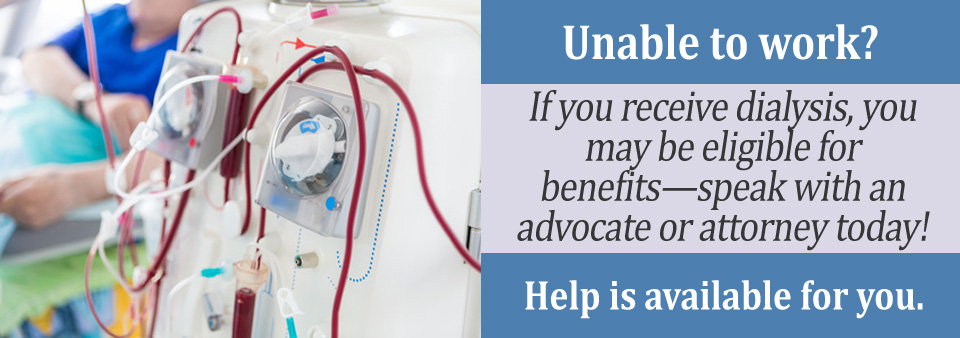Approximately 30 million people in the United States suffer from chronic kidney disease. Close to a half million of these individuals are currently receiving kidney dialysis as a result of their end-stage kidney failure.
While there are instances where dialysis is temporary, the majority of the time dialysis is permanent unless a kidney transplant occurs.
If you are currently receiving kidney dialysis and are unable to work as a result of your disability, there could be financial help available to you. The Social Security Disability Insurance (SSDI) program was created to assist those who have become disabled due to an illness such as chronic kidney disease.
What Exactly Is Kidney Dialysis?
The kidneys play an essential role in our bodies. In addition to removing waste, the kidneys also control blood pressure and balance the fluid content in our bodies. Kidney dialysis is necessary when someone develops end-stage kidney failure.
This typically occurs when 85-90% of the kidney function is lost.
There are two types of kidney dialysis: hemodialysis and peritoneal dialysis. Hemodialysis uses an artificial kidney machine to clean the blood. Peritoneal dialysis uses a solution that is placed in the abdomen and then removed.
Dialysis does not cure chronic kidney disease, although it can certainly help to provide a better quality of life and an increased life expectancy. Some people remain too ill to work while on kidney dialysis; others can return to work once they have started dialysis treatment.
However, as dialysis is time consuming and needed on a regular basis, some patients find it challenging to balance their treatment with their work schedule.

What Symptoms Do I Need to Qualify?
Individuals needing kidney dialysis often suffer from other significant health issues. Section 6.00 of the Social Security Administration’s (SSA) “Blue Book” addresses Genitourinary Disorders. This manual lists a variety of medical conditions, as well as the requirements needed to qualify for benefits under these circumstances.
If you are currently receiving dialysis and it is expected to last for at least 12 months, it is very likely that you will receive disability benefits from the SSA.
If you require kidney dialysis, you are probably already suffering from chronic kidney disease. This illness is addressed in section 6.05 of the SSA’s Blue Book, and you may already qualify for disability benefits due to your chronic kidney disease.
If you have the following symptoms, you may be eligible for SSDI:
- Some people with kidney disease begin to lose bone. If you have severe bone pain or limitations in your movement related to your illness, it may be difficult to perform any job that requires you to stand, walk, or lift objects. If this is the case, you may be eligible for help from the SSA.
- If the kidneys are unable to filter the blood, your body may be unable to release toxins. You may experience nerve pain, weakness, muscle aches, or tingling. If you have these symptoms and they are expected to last at least a year, you will be considered for help.
- As the kidneys regulate the fluid in your body, you will be considered for benefits if you develop signs of fluid overload syndrome. These symptoms may include shortness of breath, severe swelling in the abdomen, high blood pressure, or fatigue. You may also be considered if you have severe swelling throughout the body, also called edema.
- If you experience diminished appetite and significant weight loss, you may be considered eligible for benefits from social security.
- The kidneys are related to many of the other organ systems in the body. Therefore, you may experience related complications such as stroke or heart failure. If these conditions develop and you require hospitalization, you may qualify for disability benefits.
- Kidney function can be followed with lab values, such as albumin or creatinine. Should these labs be extremely elevated over time, you will be considered for social security benefits.
Do I Qualify for Social Security Benefits?
To be eligible for Social Security benefits, your medical records will need to show that your symptoms are severe enough to prevent you from working at a level which would support you. Additionally, you will need to prove that your illness is expected to be disabling for at least 12 months. As noted above, dialysis is typically a life-long need.
If you receive a kidney transplant, you will be considered disabled for at least one year from the date of transplant.
What Information Will I Need to Provide?
When applying for Social Security, you may be asked to provide the following documentation:
- Confirmation of your diagnosis of chronic kidney disease from your Nephrologist, including your treatments and progress thus far.
- All of your dialysis records, including documentation of the continued need for treatment.
- Blood tests, including creatinine, BUN, and GFR, confirming your diagnosis and showing the progression of your illness.
- Urine tests showing protein in the urine (urinalysis).
- X-rays, MRIs, or other imaging results that may show kidney abnormalities.
- Surgical Notes, biopsy results, or pathology reports, if you have had any.
- Surgical or procedure notes from any dialysis access performed.
- Notes from any other specialists, physical therapists, or other health care providers that are involved in your care.
You should speak with your doctor’s office, hospital, or other health-care providers if you are missing any of the above medical reports. The more medical evidence that you have on your side, the better your chances of receiving SSDI benefits related to your kidney dialysis.
What’s Next?
If you have chronic kidney disease and require kidney dialysis, you should contact a disability advocate or lawyer in your area immediately. When your health is suffering, it can be difficult to know where to turn or what to do next.
A qualified attorney can help you navigate the Social Security application process, leaving you time to focus on what’s most important: your health.